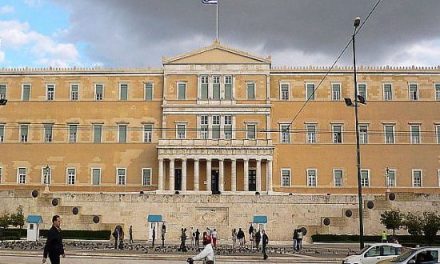On the initiative of the Speaker of the Hellenic Parliament, Nikos Voutsis, the Parliamentary Committee seeking reparations from Germany for the Nazi occupation of Greece has been re-established this week. The Committee was set up twice during previous Parliamentary Legislative periods, but the work remained unfinished on account of the early dissolution of Parliament. According to Voutsis, “the issue of German war reparations to Greece and the Greek people remains open, part of an inerasable debt that seeks its moral, historic and legal vindication”.
Addressing the previous war damages committee on April 6, then Deputy Finance Minister Dimitris Mardas had claimed that Germany owes Greece 278.7 billion euros, according to calculations by Greece’s General Accounting Office.
As stated in recent news stories, a report by the Greek State Legal Council, completed in January 2014, proposes that should Greece want to “promote its demands more strongly”, it must first follow the diplomatic course of inviting Germany to negotiate. If Germany refuses to enter into negotiations or there is failure of agreement between the two countries, then Greece should refer directly “in a binding for the parties a judicial judgment”, bypassing the Court of Arbitration of the London Agreement German External Debts as it has only non-binding jurisdiction. The view of the State Legal Council is that Greece will have to appeal to the International Court of Justice.

Greece is seeking compensation on three accounts – general war reparations, a claim resulting from the massacre at the village of Distomo in 1944, and the repayment of the forced loan exacted from the Bank of Greece in 1942-4. The latter does not fit into the category of classical war reparations and was at the time de facto recognised that it had been a case of lending.
Germany’s Responsibility and Nazi Forced Loans
Echoing Greece’s position few months ago, German President Joachim Gauck expressed support for Athens’ claims for war damages, noting that Germany should consider its historical responsibility to Greece.
Earlier this year, several German politicians called on the federal government to compensate Greece for the effects of the Nazi occupation. “We should hold a discussion about reparations…”, the SPD’s deputy leader Ralf Stegner has obsedrved, while the SPD’s Gesine Schwan remarked that in her view, “the situation is politically straightforward: we should reach out financially to the victims and their relatives”. Moreover, the legal department of the German Parliament has confirmed Greece’s right to claim repayment in a 2013 experts’ report.
Greece’s right to claims has also been well documented by prominent scholars, including economic historian Albrecht Ritscl and University of Athens professor Hagen Fleischer, suggesting that besides political negotiations on reparations, debts from forced loans have to be paid back “with no ifs or buts”.

As Fleischer underlined earlier this year, “in early 1945, in the final days of the Third Reich, a group of high-ranking German economists calculated this ‘German debt (Reichsschuld) to the Greek state’ to amount to 476m Reichsmarks, which would be roughly €10bn today”. This debt should form the basis for talks about the establishment of a “future fund” for the financing of a symbolic infrastructure project. This would however require a major change of attitudes in Germany, whose postwar governments continue “to be in denial” about the existence of this debt, which was “officially recognised even by the Nazi regime”.
See also: Alexis Tsipras’s speech on WWII German War Reparations owed to Greece (10.2.2015); Hagen Fleischer’s interview: ‘Germany turns a deaf ear to claims’; Deutche Welle: Gerrman coalition politicians break ranks on Greek WWII reparations
TAGS: FOREIGN AFFAIRS | HISTORY














